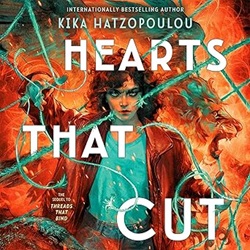
 Hearts That Cut
Hearts That CutReview posted September 10, 2024
Listening Library, 2024. 12 hours, 20 minutes.
Review written June 27, 2024, from a library eaudiobook.
Starred Review
Let me start out by saying that I love the recent trend of fantasy duologies instead of trilogies. Honestly, I'm probably more delighted with it because I'd gotten used to trilogies, so every time I pick up a second book expecting a dark middle act and instead get a triumphant ending and don't have to wait for more - I'm almost giddy with delight.
I've also found that books where I had reservations about the first one in the series, especially world-building details (How would that really work?) - I forget about those reservations when I read the second book probably because I've gotten used to the ideas and am now ready to treat them as underlying assumptions. This happened recently with Ghostsmith and happened again with Hearts That Cut. I don't think this is a flaw in the authors' world-building. I think it's my tendency to be highly critical of world-building when it's first presented to me. In the case of this book's predecessor, Threads That Bind, it was hard for me to get on board with a world where invisible threads connect people with everything they love. Our heroine, Io, has the ability to see those threads - and cut them. All I could think about was how hopelessly tangled those threads would get. But in this book, I'd already accepted the idea and the magic governing it, and wasn't worried about that.
Another quibble with the original is the existence of the Otherborn - descendants of gods with specific powers. First off, there are just a multitude of different types of Otherborn, all with a different color shining in their eyes when they exercise their powers, and how would anyone remember them all? But more unrealistic is that certain Otherborn - such as Io's family - always have a certain number of siblings. And it's not like Io and her sisters were triplets. What if their parents hadn't actually wanted to have three kids? Would Io's older siblings not have gotten their powers? And how are there so many different Otherborn with specific numbers of siblings? Like the nine Muse sisters, for crying out loud? How does that work out?
But I actually didn't think much about all that when I was listening to this book. (I thought about it again when I went to write this review. Probably shouldn't have!) And I ended up loving this book. There's some time manipulation involved in the plot (because of specific powers by certain individuals), and I usually don't like that - but in this case it was handled well, as a problem to be solved, and I loved how it all came together.
As the book opens, Io is traveling through the Wastelands with Bianca, the former Mob Queen of Alante, who has been turned into a wraith with a severed life thread. She's trying to track down the gods who ordered the deaths at the end of the last book, and she has hold of a gold thread leading her in that direction. But that plan gets stymied.
She's left behind Edei, the young man she's connected to with a Fate thread, and worries that the thread is fraying. Does Edei not want to be with her? And does he feel manipulated into loving her?
I like the way the plot progresses - though I don't want to give away anything from the first book. I like the community spirit in the Wastelands that Io and Bianca find among people fleeing the many natural disasters gripping their continent. And I like the scrappy band of folks who eventually assemble and who try to make things right against all odds.
So whatever you may think about the likelihood of a world featuring fabulously gifted descendants of the gods in a post-apocalyptic landscape - Kika Hatzopoulou gives us plenty of depth and insights about such a world. I was a bit ambivalent after the first book, but I'm so glad I read on, because now I'm convinced the two make a magnificent story about the resilience of humanity itself.
